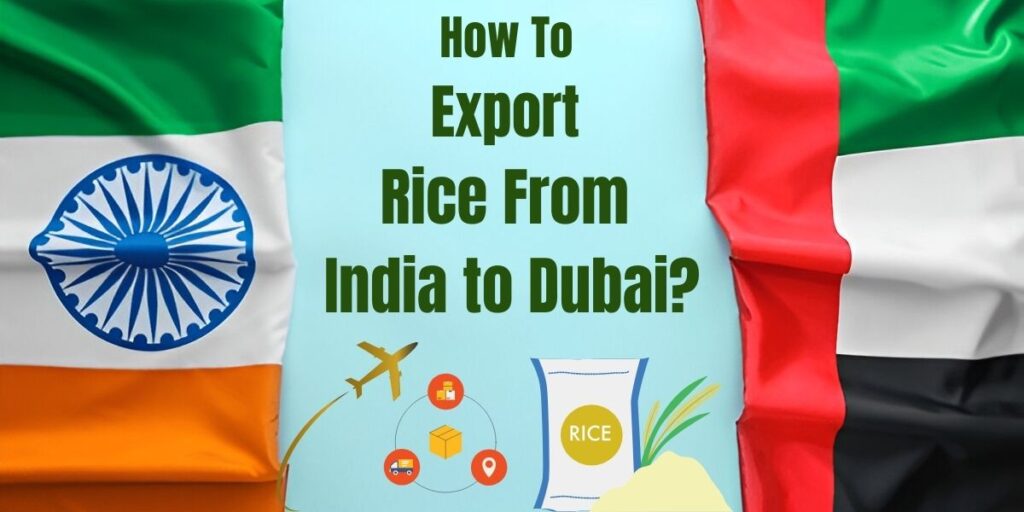


India ranks among the world’s top rice exporters, supplying premium Basmati and Non-Basmati rice to markets around the world, including Dubai. With its superior quality, rich aroma, and long grains, Indian rice is highly sought after in the UAE food industry. However, exporting rice from India to Dubai is more than just shipping goods—it requires a deep understanding of export regulations, documentation, logistical needs, and market trends.
Whether you’re a first-time exporter or looking to expand your business, this comprehensive guide will walk you through the step-by-step process of rice export, covering legal requirements, packaging guidelines, logistics, and marketing strategies to ensure a smooth and profitable trade. Furthermore, if you plan to tap into Dubai’s growing demand for Indian rice, here is your customized roadmap to success.
Rice is a major import because of Dubai’s growing population, tourism, and food industry. Moreover, here’s why exporting rice to Dubai is a profitable opportunity:

Dubai imports over 1.5 million tonnes of rice annually, creating huge opportunities for Indian exporters.

Consumers in Dubai prefer Indian Basmati rice for its superior aroma and exceptional quality.

Dubai serves as a gateway to Middle Eastern and African markets, offering regional expansion potential.

Zero import duty on rice in Dubai (UAE) makes it financially attractive for exporters.
To legally step-by-step process to export rice from India to Dubai, you need the following registrations:
Different rice varieties cater to various segments in Dubai’s market:
| Rice Type | Demand in Dubai | Key Buyers |
|---|---|---|
| Basmati Rice | High (Premium market) | Hotels, Restaurants |
| Non-Basmati Rice | Moderate (Affordable segment) | Supermarkets, Wholesalers |
| Brown/Organic Rice | Growing (Health-conscious buyers) | Organic Stores |
To secure buyers for your rice exports, use the following channels:
Proper packaging and labeling are essential for maintaining product quality and ensuring compliance with Dubai’s import regulations. Moreover, well-packaged rice not only preserves freshness but also enhances brand value in the competitive export market.
Packaging Guidelines
Mandatory Labeling Requirements
Every rice package must include the following details to meet Dubai’s food safety standards:





Furthermore, a well-labeled and properly packaged product builds trust among buyers and enhances the chances of success in the Dubai rice export market.
Efficient logistics and shipping processes are crucial for successfully export rice from India to Dubai. Choosing the right shipping method depends on cost, urgency, and order size. Moreover, here’s a detailed comparison to help you select the best option for your business.
| Shipping Method | Best For | Route | Transit Time | Cost |
|---|---|---|---|---|
| Sea Freight | Bulk Orders (Cost-effective) | Mumbai → Jebel Ali Port (Dubai) | 7-10 Days | Lower |
| Air Freight | Urgent Shipments (Fast but expensive) | Direct Flights | 1-3 Days | Higher |
Essential documents required for exporting rice to Dubai:
The shipping cost from India to Dubai varies depending on the mode of transportation, the volume of the shipment, and the customs duties. Furthermore, sea freight is the most cost-effective option for bulk rice exports, with rates ranging from 4,000 to 10,000 per metric ton, which makes it ideal for wholesalers and large buyers. However, air freight is significantly more expensive, costing between $250 and $350 for urgent deliveries, while ground freight costs between $250 and $400 ₹30,000 to ₹50,000 per metric ton. Furthermore, it is important for exporters to work with a reliable freight forwarder and optimize logistics planning in order to minimize costs and ensure timely delivery.
The rice export cost from India to Dubai per kg varies based on factors such as rice variety, quality, demand, and prevailing international market trends. Further, Premium Basmati rice is more expensive due to its superior aroma and grain length, whereas Non-Basmati rice is more affordable for bulk buyers. In addition, below is an approximate price list for different rice varieties exported from India to Dubai, helping exporters make informed decisions for profitable trade.
| S.No | Rice Variety | Grain Length | Rice Type | Ex-Mill Price per Ton (INR) | FOB Price per Ton (INR) | Price per Kg (INR) |
|---|---|---|---|---|---|---|
| 1 | 100% Broken Parboiled Rice | 4.80mm | Non-Basmati | ₹35,000 | ₹38,500 | ₹38.50 |
| 2 | 100% Broken Raw Rice | 4.75mm | Non-Basmati | ₹33,500 | ₹37,000 | ₹37.00 |
| 3 | 1121 Creamy Sella Basmati Rice | 8.25mm | Basmati | ₹70,500 | ₹74,500 | ₹74.50 |
| 4 | 1121 Golden Sella Basmati Rice | 8.30mm | Basmati | ₹75,000 | ₹79,500 | ₹79.50 |
| 5 | 1121 Steam Basmati Rice | 8.35mm | Basmati | ₹78,500 | ₹82,000 | ₹82.00 |
| 6 | 1401 Raw Basmati Rice | 7.60mm | Basmati | ₹95,000 | ₹99,500 | ₹99.50 |
| 7 | 1401 Steam Basmati Rice | 7.65mm | Basmati | ₹92,500 | ₹97,000 | ₹97.00 |
| 8 | 1509 Creamy Sella Basmati Rice | 8.10mm | Basmati | ₹60,000 | ₹64,000 | ₹64.00 |
| 9 | 1509 Golden Sella Basmati Rice | 8.15mm | Basmati | ₹63,500 | ₹67,500 | ₹67.50 |
| 10 | 1509 Steam Basmati Rice | 8.20mm | Basmati | ₹65,000 | ₹69,000 | ₹69.00 |
| 11 | IR 64 Parboiled Rice | 6.30mm | Non-Basmati | ₹43,500 | ₹47,000 | ₹47.00 |
| 12 | IR 64 Raw Rice | 6.20mm | Non-Basmati | ₹42,000 | ₹45,000 | ₹45.00 |
| 13 | PR 11/14 Creamy Sella Basmati Rice | 6.70mm | Non-Basmati | ₹44,500 | ₹48,000 | ₹48.00 |
| 14 | PR 11/14 Golden Sella Basmati Rice | 6.75mm | Non-Basmati | ₹46,000 | ₹49,500 | ₹49.50 |
| 15 | PR 11/14 Steam Rice | 6.80mm | Non-Basmati | ₹45,000 | ₹48,500 | ₹48.50 |
| 16 | Pusa Creamy Sella Basmati Rice | 7.90mm | Basmati | ₹85,500 | ₹90,000 | ₹90.00 |
| 17 | Sarbati Creamy Sella Basmati Rice | 7.50mm | Basmati | ₹77,500 | ₹82,000 | ₹82.00 |
| 18 | Sarbati Golden Sella Basmati Rice | 7.55mm | Basmati | ₹79,500 | ₹84,000 | ₹84.00 |
| 19 | Sarbati Steam Basmati Rice | 7.60mm | Basmati | ₹81,500 | ₹86,000 | ₹86.00 |
| 20 | Sona Masoori Parboiled Rice | 5.50mm | Non-Basmati | ₹50,500 | ₹54,500 | ₹54.50 |
| 21 | Sona Masoori Raw Rice | 5.40mm | Non-Basmati | ₹48,000 | ₹52,000 | ₹52.00 |
| 22 | Sona Masoori Steam Rice | 5.45mm | Non-Basmati | ₹49,500 | ₹53,500 | ₹53.50 |
| 23 | Sugandha Creamy Sella Basmati Rice | 7.80mm | Basmati | ₹83,500 | ₹88,000 | ₹88.00 |
| 24 | Sugandha Golden Sella Basmati Rice | 7.85mm | Basmati | ₹85,000 | ₹89,500 | ₹89.50 |
| 25 | Sugandha Steam Basmati Rice | 7.90mm | Basmati | ₹87,000 | ₹91,500 | ₹91.50 |
| 26 | Swarna Parboiled Rice | 5.30mm | Non-Basmati | ₹42,500 | ₹46,000 | ₹46.00 |
| 27 | Swarna Raw Rice | 5.20mm | Non-Basmati | ₹41,000 | ₹44,500 | ₹44.50 |
| 28 | Traditional Creamy Sella Basmati Rice | 7.70mm | Basmati | ₹90,000 | ₹95,000 | ₹95.00 |
| 29 | Traditional Raw Basmati Rice | 7.50mm | Basmati | ₹98,000 | ₹105,000 | ₹105.00 |
*Prices fluctuate based on demand and supply, freight rates, and government policies.
To maximize sales and brand reach in Dubai, follow these strategies:
Exporting rice from India to Dubai is a profitable business opportunity, given the high demand and favorable trade policies. Also, following all the necessary steps for registration, packaging, and shipping can lead to the establishment of a successful export business.
At Shah Enterprises, we offer high-quality rice varieties, ensuring that your rice meets international standards and is ready for export rice from India to UAE. In addition, whether you are searching for the best rice in India or the best rice for international trade, we have you covered.
Furthermore, for more information on exporting rice from India or the top 10 rice exporting countries, please don’t hesitate to reach out. Start your rice export business today with the right knowledge and resources!
Yes, India is one of the top rice exporters, and rice export to Dubai is a profitable business due to the high demand for premium varieties like Basmati.
To import rice from India to UAE, register with the UAE authorities, find reliable suppliers, and ensure compliance with labeling and documentation standards.
The cost of exporting rice from India to Dubai varies, with sea freight ranging from ₹4,000 to ₹10,000 per metric ton and air freight between ₹30,000 to ₹50,000 per metric ton.
No, there is no import duty on rice in Dubai (UAE), making it a favorable destination for rice exports.
Essential documents for rice export include a Commercial Invoice, Packing List, Certificate of Origin, Phytosanitary Certificate, and Bill of Lading.
You can find export buyers through B2B platforms like Alibaba, TradeIndia, Dubai Trade, or by participating in trade fairs like Gulfood Dubai and Foodex Saudi.